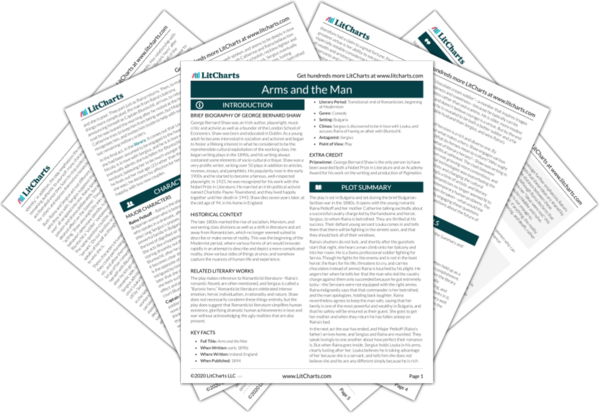Another of the central questions of Arms and the Man concerns the nature of heroism. What makes a hero? What does it mean to be a hero? What responsibilities does such a label convey? At first, Sergius is painted as a hero—he led a successful cavalry charge, displaying immense (in fact foolhardy) bravery. He is physically strong, courageous, and handsome. He thus embodies a very traditional kind of heroism. But it is made clear that Sergius’s actions are considered by more seasoned soldiers to be farcical. Though Raina and her mother fawn over Sergius, in part because Raina is betrothed to him, others find him more of a clown than a hero.
Bluntschli is a kind of “anti-hero.” He is dubbed by Raina to be the “chocolate cream soldier”—a moniker that inspires images of weakness and sweetness—because he typically carries chocolates rather than extra ammo. He is older, more modest looking, and doesn’t believe courage is a virtue. But by the end of the play he is revealed to be both a better soldier and a far more desirable husband than Sergius, and wins Raina’s affections.
The question of heroism is a rich and diverse one. By wondering about what makes a hero, Shaw engages various lines of thinking. What do heroes mean to culture? Who ought to be a hero? And what of literary heroes?—Shaw was writing in a time of social and political upheaval. The clash between socialism and capitalism was growing more contentious, and the rise of new industrial technologies was exacerbating the already sharp class divisions and changing the cultural landscape. It was accordingly a time of artistic and literary upheaval as well: literary Romanticism no longer seemed fit to make sense of or address contemporary human problems. The Byronic, romantic hero had been forsaken—what would the new literary heroes look like? By engaging these questions about heroism Shaw is asking questions about the future of culture and art.
Heroism ThemeTracker

Heroism Quotes in Arms and the Man
I am a Swiss, fighting merely as a professional soldier. I joined Servia because it came first on the road from Switzerland.

Unlock explanations and citation info for this and every other Arms and the Man quote.
Plus so much more...
Get LitCharts A+Oh you are a very poor soldier—a chocolate cream soldier! Come, cheer up.
Dearest, all my deeds have been yours. You inspired me. I have gone through the war like a knight in a tournament with his lady looking down on him!
Which of the six of me is the real man? That’s the question that torments me. One of them is a hero, another a buffoon, another a humbug, another perhaps a bit of a blackguard. And one, at least, is a coward—jealous, like all cowards.











